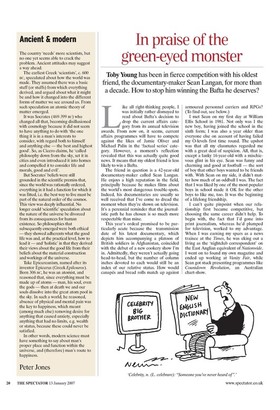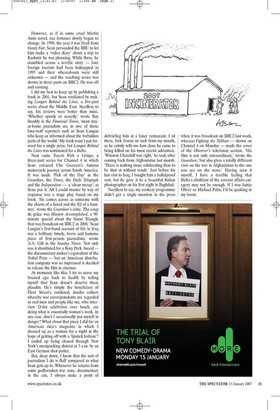In praise of the green-eyed monster
Toby Young has been in fierce competition with his oldest friend, the documentary-maker Sean Langan, for more than a decade. How to stop him winning the Bafta he deserves?
Like all right-thinking people, I was initially rather dismayed to read about Bafta's decision to drop the current affairs category from its annual television awards. From now on, it seems, current affairs programmes will have to compete against the likes of Jamie Oliver and Michael PalM in the 'factual series' category. However, a moment's reflection revealed that this was actually quite good news. It means that my oldest friend is less likely to win a Bafta.
The friend in question is a 42-year-old documentary-maker called Sean Langan. He enjoys a high reputation in the field, principally because he makes films about the world's most dangerous trouble-spots. Indeed, his documentaries are usually so well received that I've come to dread the moment when they're shown on television. It's a perennial reminder that the journalistic path he has chosen is so much more respectable than mine.
This year's ordeal promised to be particularly acute because the transmission date of his latest documentary, which depicts him accompanying a platoon of British soldiers in Afghanistan, coincided with the debut of a new cookery show I'm in. Admittedly, they weren't actually going head-to-head, but the number of column inches devoted to each would still be an index of our relative status. How would canapes and bread rolls match up against armoured personnel carriers and RPGs? (To find out, see below.) I met Sean on my first day at William Ellis School in 1981. Not only was I the new boy, having joined the school in the sixth form; I was also a year older than everyone else on account of having failed my 0-levels first time round. The upshot was that all my classmates regarded me with a great deal of suspicion. All, that is, except a lanky 16-year-old with a mischievous glint in his eye. Sean was funny and charming and good at football — the sort of boy that other boys wanted to be friends with. With Sean on my side, it didn't matter how much of an oddball I was. The fact that I was liked by one of the most popular boys in school made it OK for the other boys to like me, too. It was the beginning of a lifelong friendship.
I can't quite pinpoint when our relationship first became competitive, but choosing the same career didn't help. To begin with, the fact that I'd gone into print journalism, whereas he'd plumped for television, worked to my advantage. When I was earning my spurs as a news trainee at the Times, he was eking out a living as the 'nightclub correspondent' on the East Anglian equivalent of Nationwide. I went on to found my own magazine and ended up working at Vanity Fair, while Sean got stuck presenting programmes like Countdown Revolution, an Australian chart-show.
However, as if in some cruel Martin Amis novel, our fortunes slowly began to change. In 1998, the year I was fired from Vanity Fair, Sean persuaded the BBC to let him make a 'video diary' about a trip to Kashmir he was planning. While there, he stumbled across a terrific story — four foreign tourists had been kidnapped in 1995 and their whereabouts were still unknown — and the resulting series was shown in three parts on BBC2. He was off and running.
I did my best to keep up by publishing a book in 2001, but Sean retaliated by making Langan Behind the Lines, a five-part series about the Middle East. Needless to say, his reviews were better than mine. 'Whether openly or secretly,' wrote Ray Snoddy in the Financial Times, 'most stayat-home journalists are in awe of those lone-wolf reporters such as Sean Langan who keep us informed about the forbidden parts of the world.' My book wasn't put forward for a single prize, but Langan Behind the Lines was nominated for a Bafta.
Next came Travels With a Gringo, a three-part series for Channel 4 in which Sean retraced Che Guevara's famous motorcycle journey across South America. It was made 'Pick of the Day' in the Guardian, the Times, the Daily Telegraph and the Independent — a 'clean sweep', as Sean put it. All I could muster by way of response was a stage play based on my book. 'He comes across as someone with the charm of a lizard and the IQ of a hamster,' wrote the Guardian's critic. The coup de grace was Mission Accomplished, a 90minute special about the Sunni Triangle that was broadcast on BBC2 in 2004. 'Sean Langan's first-hand account of life in Iraq was a brilliant, timely, brave and humane piece of first-person journalism,' wrote A.A. Gill in the Sunday Times. Not only was it shortlisted for a Rory Peck Award — the documentary-maker's equivalent of the Nobel Prize — but an American distribution company was so impressed it decided to release the film in cinemas.
At moments like this, I try to nurse my bruised ego back to health by telling myself that Sean doesn't deserve these plaudits. He's simply the beneficiary of Fleet Street's outdated, macho culture whereby war correspondents are regarded as real men and people like me, who interview D-list celebrities over lunch, are doing what is essentially women's work. In any case, don't I occasionally put myself in danger? What about that piece I did for an American men's magazine in which I dressed up as a woman for a night in the hope of getting off with a 'lipstick lesbian'? I ended up being chased through New York's meatpacking district at 3 a.m. by an East German shot-putter.
But, deep down, I know that the sort of journalism I do is fluff compared to what Sean gets up to. Whenever he returns from some godforsaken war zone, documentary in the can, I always make a point of debriefing him at a fancy restaurant. I sit there, fork frozen an inch from my mouth, as he calmly tells me how close he came to being killed on his most recent adventure. 'Winston Churchill was right,' he said, after coming back from Afghanistan last month. 'There is nothing more exhilarating than to be shot at without result.' Just before his last visit to Iraq, I bought him a bulletproof vest, but he gave it to a beautiful Italian photographer on his first night in Baghdad.
Needless to say, my cookery programme didn't get a single mention in the press when it was broadcast on BBC2 last week, whereas Fighting the Taliban — shown on Channel 4 on Monday — made the cover of the Observer's television section. 'His film is not only extraordinary,' wrote the Guardian, 'but also gives a totally different view on the war in Afghanistan to the one you see on the news.' Having seen it myself, I have a terrible feeling that Bafta's abolition of the current affairs category may not be enough. If I was Jamie Oliver or Michael PalM, I'd be quaking in my boots.























































 Previous page
Previous page